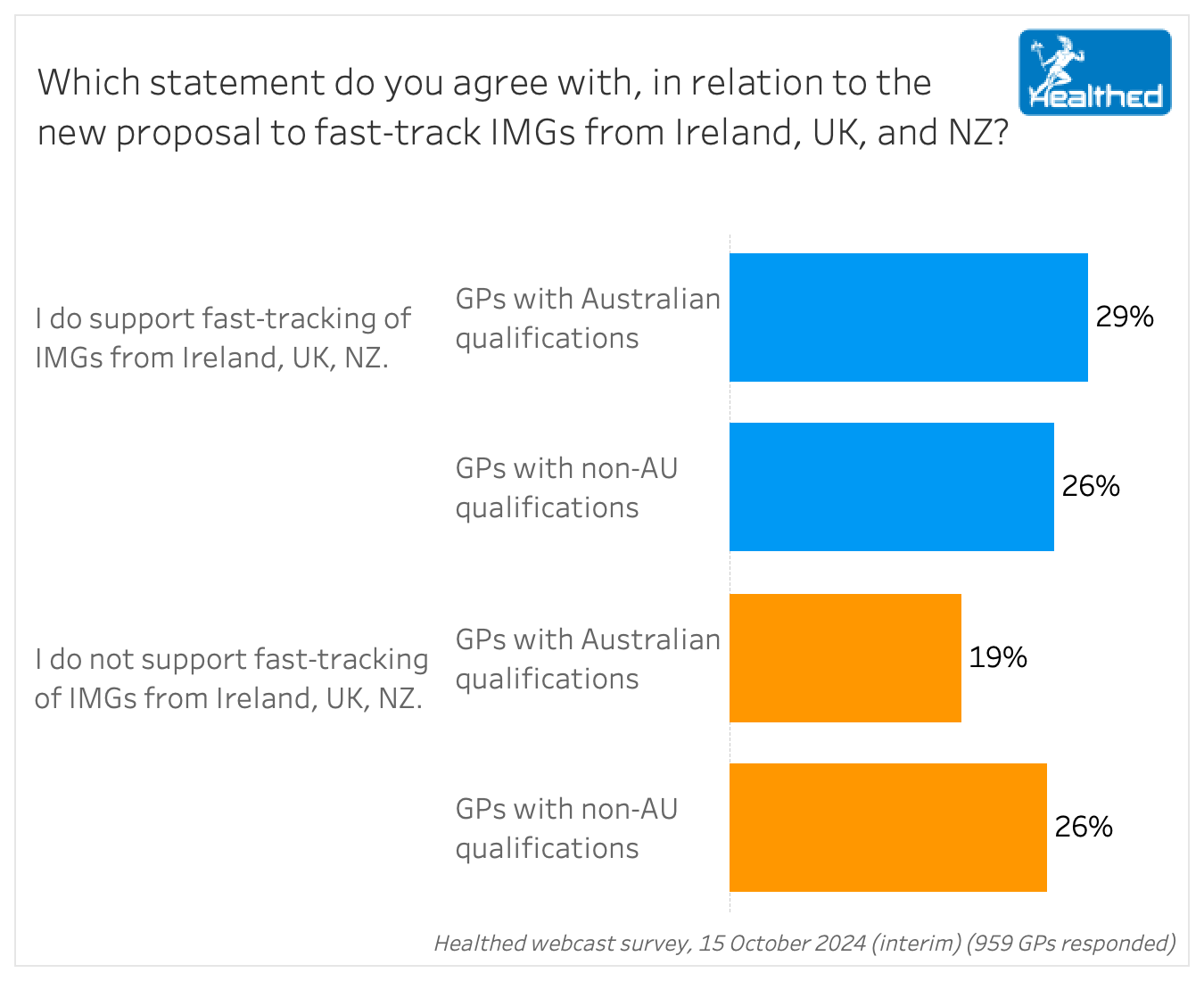Articles / Do you support fast-tracking NZ, UK and Irish IMGs? Poll results

Starting on Monday, 21 October, GPs from Ireland, New Zealand and the UK will be eligible for fast-tracked approval to work in Australia – but not everyone is happy about the plan.
The RACGP has strongly opposed the decision, saying that the health ministers and AHPRA have “pushed this through regardless of the major risks, unanswered questions, and lack of detail about how a GP’s suitability to practice will be assessed, just a week before it’s due to be implemented.”
“RACGP data shows one in five doctors require extra education and professional support despite their qualifications being substantially comparable on paper to those of Australian GPs. This is why qualifications should only be part of the assessment of a medical professional’s readiness to practice in Australia,” RACGP president Dr Nicole Higgins said.
Yet over half of the College’s membership take a different view.
A national Healthed survey with 1200 respondents so far showed that 56% of GPs support the initiative, while 44% align with the College in opposing it.
Just over half (51%) of survey respondents are international medical graduates, with around 5% from hailing from the three countries that will be eligible for fast-tracking.
GPs who trained overseas were less likely to support the fast-tracked pathway for doctors from the UK, Ireland and NZ than their counterparts who trained in Australia.
“As an IMG myself, having had to endure costly, time-consuming and stressful assessments, I feel the same criteria should apply to all IMGs, not just some,” one GP commented.

Dr Mukesh Haikerwal, deputy chair of the Australian GP Alliance and former president of the AMA, is himself a UK-trained IMG who came to Australia in 1990 under a reciprocal agreement. He agrees that the current system is far too onerous — but says any fast-tracked process needs sufficient quality control – and should not be restricted to three countries only.
“The RACGP has its own internal issues to sort out, because they have been singularly difficult… so much so that people who have been recruited don’t fulfil their pledge to move to the country because it’s so many layers of complexity. They just say ‘it’s too hard, I’m not going to do this,” Dr Haikerwal said.
But while he sympathises with the government’s decision, he says it’s crucial to ensure all GPs are held to the same standard, have equivalent training and an orientation process – as well as an ongoing review process.
“I think this is a place for a quality control committee from within the profession,” Dr Haikerwal said.
“If we don’t do that properly, we’ll end up with the problems we saw in Queensland when the Queensland government fast-tracked Dr Patel – bypassed the normal processes and we came to that situation that was not acceptable.”
“IMGs need to have the same rights – commercial rights, legal rights and professional rights as any doctor in the country. Otherwise it becomes almost slave labour,” he added.
“If this impetus gives the College an opportunity to get their house in order, that’s a good thing. Even if there is this fast-track process now, I think that there has to be a standard adhered to for any professional, any GP working in this country, set by our Colleges,” Dr Haikerwal said.
“Which, even though they have been fast-tracked through and been given the stamp by our prior medical boards and governments, who then take ultimate responsibility for this, by the way, in the interest of the Australian population, the Colleges have to be the arbiter of the standard, not a government, not a politician, not a bureaucrat, but a doctor trained in this sort of stuff. That’s why the colleges are still very important.”
“They have to actually make sure that they continue to maintain a quality for the patients of Australia to maintain that high standard Australians are used to.”
Many GPs in Healthed’s survey, as well as Dr Haikerwal, have questioned why the fast-tracked process has been restricted to GPs from the UK, Ireland and New Zealand.
Dr Higgins has criticised the choice, citing the potential differences in medical education in an interview with the Medical Republic, noting that the Medicare and PBS systems, as well as rural and regional contexts, differ substantially – yet restricting eligibility to these three countries in particular was based on recommendations from the RACGP.
“We have been clear that if this is to happen so soon, only GPs with training in contexts most similar to Australia should qualify – the UK, New Zealand, and Ireland – but we have not been informed what qualifications will be eligible. This isn’t about which countries are ‘best’, it’s about which practitioners will be able to practice safely in an Australian context from day one. Australia is a different context with different systems to the US and Canada, for example,” Dr Higgins explained in a media release published in September.
Do you support fast-tracking IMGs from UK, NZ and Ireland?
Here are some comments from GPs in Healthed’s survey this week:
Yes, but…
“I feel Australian GPs with FRACGP should be afforded reciprocal recognition in the corresponding countries.”
“As long as it is reciprocal and we can easily work over there if we want to do locums overseas.”
“Yes, however additional support measures or an in-house point of contact for the transition should continue, as the systems are very different (I am a UK-trained GP that came over on the specialist program.)”
“Fast-tracking is ok as long as they receive some form of bridging assistance.”
“There should also be a way to fast-track SIMG specialists from other regions. Not only the UK, NZ, and Ireland. Maybe a different type of assessment instead of a College assessment.”
“In that case what about IMGs from other countries? They should be considered too with equivalent qualifications.”
“It should apply to many more countries.”
Yes
“Standards in these three countries are as good as those in Australia, in my humble experience.”
“I was trained in the UK and had no great problem – other than getting my head around item numbers.”
“I was fast tracked from NZ 45 years ago, as degrees were recognised then. If the Medical School standards and curriculum etc are known and respected, I see no reason why not accept these doctors.”
“I am an IMG from the UK and had a very stressful two years of AMC bridging course and exams and RACGP exams to deal with at the same time as settling my kids into schools and supporting my husband, whilst unable to earn an income. I think I was competent to work in general practice without this, considering I had MRCP paediatrics and MRCGP from the UK.”
“As a UK trained GP. I feel the training there is quite adequate and comparable to local training.”
“Graduates from these countries are equivalent to Australian doctors.”
“This makes a lot of sense, we have a workforce shortage and there is already too much red tape involved for doctors to start work in Australia, which would put a lot of people off even considering coming to Australia.”
“These countries in particular have a very similar level of training and I would have no concerns working with a colleague who has completed fellowship in these countries. I feel like it was unnecessary for the RACGP to get in the media and complain about this. I felt like it came across poorly and did not represent the college well.”
No
“All must be assessed by RACGP.”
“The assessment doesn’t need to be extensive, but I think it important that IMGs from anywhere, should be reviewed by the RACGP.”
“I think it is important to be assessed by RACGP so that the doctors are oriented to practice in Australia.”
“Poorly trained IMGs can use the UK as a back door into the Australian system.”
“Why does the government continually seek to solve general practice manpower issues by bringing in overseas doctors and devaluing what we do by thinking any nurse or pharmacist can do our job better, and reducing rebates, rather than making it a respected and professionally satisfying and financially realistic option for young doctors?”
“It is not a guarantee that they are up to par unless they are checked.”
“I am concerned about dropping down the standard of practising medicine in Australia with the fast tracking.”
The current proposal is unfair
“All IMGs should have the same process not just from the above countries.”
“It is unfair for hardworking GPs who did all the assessments by RACGP and received training programs for the fellowship.”
“Too selective and discriminatory.”
It’s not ideal but…
“It is a shame we are poaching other country’s doctors, rather than training more of our own and incentivising GP. However, UK, Ireland and NZ can lose more doctors than Africa, and parts of Asia.”

Menopausal Hormone Therapy - What Dose of Estrogen is Best?

Cardiovascular Benefits of GLP1s – New Evidence

Oral Contraceptive Pill in Teens

RSV and the Heart

Modified but kept in place
Eliminated entirely without replacement
Maintained as is
Completely replaced with an alternative system
Listen to expert interviews.
Click to open in a new tab
Browse the latest articles from Healthed.
Once you confirm you’ve read this article you can complete a Patient Case Review to earn 0.5 hours CPD in the Reviewing Performance (RP) category.
Select ‘Confirm & learn‘ when you have read this article in its entirety and you will be taken to begin your Patient Case Review.
Menopause and MHT
Multiple sclerosis vs antibody disease
Using SGLT2 to reduce cardiovascular death in T2D
Peripheral arterial disease
